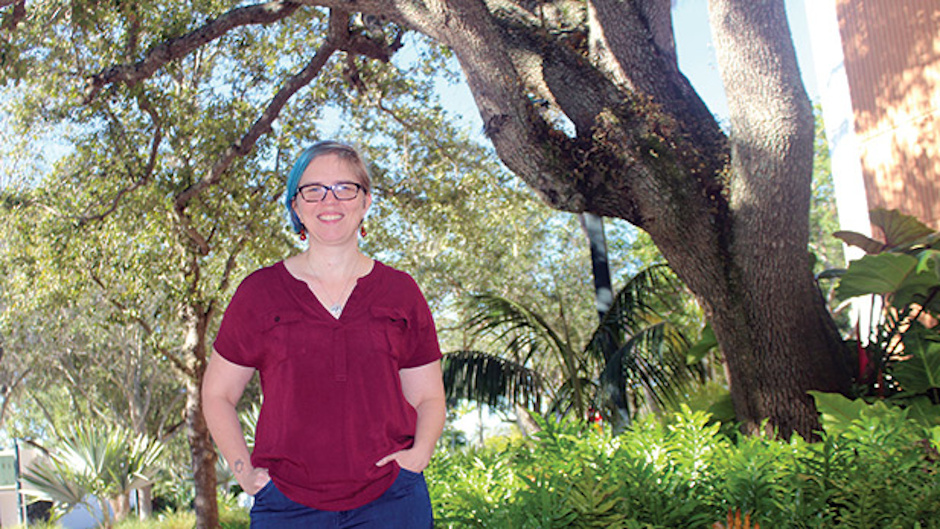If you ask Jessica Owley to recall her favorite protest anthem, she happily breaks into song:
"There once was a union maid, she never was afraid
Of goons and ginks and company finks and the deputy sheriffs who made the raid.
She went to the union hall when a meeting it was called,
And when the company guards came 'round
She always stood her ground."
The newly arrived Professor of Law learned the art of disruption from her mother. As the daughter of a labor leader, union head, and activist, the Milwaukee, Wisconsin native was a proud attendee of the picket line and protest marcher at a tender age.
She credits her mother's "free-range" parenting with allowing her the opportunity to roam far beyond her blue-collar neighborhood—doing abortion clinic defense in middle school to living on a farm in Norway as an exchange student in high school to delving into an "excessive amount of education." One benefit: the Norwegian exchange experience exposed her to a very disparate connection to caring for the earth and planted the early seedlings of her life's path.
"Norwegians have a completely different relationship with the environment," she says. "Eight people were living on the farm, and there was so little garbage. Much more attention was paid to packaging and how things could be reused. Maybe small things but with big impact but to a teenager, it was really different. In 1990s inner-city Milwaukee, this was never a subject of conversation."
Owley had a teacher who often suggested that the high school student would become Secretary of Labor someday. "'Secretary of the Interior,' I thought to myself. But you know it's sometimes nice to go into something that your parents aren't expert in," she says over a kale salad, and water, no ice, sipped through a metal straw she pulls from her bag. "Though my secret ambition was probably closer to becoming head of the Environmental Protection Agency."
The early Al Gore fan/reader recalls that the Exxon Valdez's 53.1-million-gallon oil spill into the pristine Prince William Sound in Alaska resonated deeply in her teenage mind.
"It was an event with an enormous global impact, and where people could go help, and make an impact," she says. "I was struck by how a small accident by one or two people could cause such far-reaching environmental destruction."
Owley came to Miami Law to teach Property, Environmental Law and Policy, and to use her bully pulpit to effect forward movement on climate change, sustainability, and land conservation.
She arrived at law school after first embracing the good fight of environmental exploration, as a graduate instructor at the University of California, Berkeley, while obtaining twin master's degrees in environmental science, policy, and management as well as in landscape architecture in environmental planning. She ran the Spoonbill Action Voluntary Echo, a non-profit which focused on preserving fragile ecosystems and offering alternative development proposals in coastal Taiwan. Years before that, Owley had received a Bachelor of Arts in physics from Wellesley College, interned at the Wisconsin Department of Public Works, and moved to Atlanta for a year with AmeriCorps.
Owley surely took to law—her curriculum vitae is 18 pages long and chock-a-block with law journal and peer-reviewed articles (39!), white papers, book chapters, invited talks, and works-in-progress, all accomplished since her graduation from Berkeley Law in 2004.
She took a turn as an Assistant Law Professor at Pace Law School, in White Plains, New York, before joining SUNY Buffalo Law School rising to Professor and Director of the Environmental Program, Co-director of the Environmental LL.M., as well as teaching an Environmental Law course for business lawyers at the Universidad Pontifica Comillas, in Madrid, Spain.
"There isn't a huge community writing about private land conservation—either looking at federal environmental laws or international treaties, but there is a lot that can be done on private land by private organizations worldwide as a recognition of the critical role that that is playing," she says. "I have written a lot on that and will continue to do so in the future." Her 2018 paper, "Climate Change Challenges for Land Conservation: Rethinking Conservation Easements, Strategies, and Tools," won the 2019 Morrison Prize for most impactful sustainability-related legal academic paper in North America.
At Miami Law, Owley brings frontline experiences to her students. In December, Owley and six UM Law students traveled to Madrid to attend the annual Conference of the Parties to the United Nations Framework Convention on Climate Change. Students participated as official accredited observers to the UN’s Climate Change Treaty negotiation. They met with people from all around the world to learn how communities are suffering from and tackling climate change, while also sharing their experience of living and studying climate change in Miami. “While there, the students had the unique opportunity to see how an international treaty is negotiated and to engage in problem-solving for the greatest problem of our era: climate change,” said Owley. This marks the fifth time that Owley has attended the summit.
"It's such an incredible opportunity," she said, "I am in the process of filing for the same status for all of UM now. That is just the start of things to come."
In the meantime, Owley, her husband Julian Lippmann, who is a lecturer in UM's biomedical engineering department, and their two daughters are getting to know their new hometown. They would like to find avenues to practice a little "free-range parenting" of their own. In Madrid, they were stymied by rules that didn't allow children even to take the elevator in their apartment building alone. In Buffalo, forms and discussions with bus drivers were required to let the girls cross the street parent free.
"Here, we let them walk around the neighborhood on their own," Owley says of the work in progress. "We dream of ways to try to build up their independence."
More Miami Law Magazine Articles

